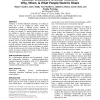524 search results - page 22 / 105 » Why phishing works |
CHI
2005
ACM
14 years 8 months ago
2005
ACM
Advances in location-enhanced technology are making it easier for us to be located by others. These new technologies present a difficult privacy tradeoff, as disclosing one's...
WWW
2008
ACM
14 years 9 months ago
2008
ACM
The term "Web 2.0" is used to describe applications that distinguish themselves from previous generations of software by a number of principles. Existing work shows that...
MOZ
2004
Springer
14 years 1 months ago
2004
Springer
Common programming practice grants excess authority for the sake of functionality; programming principles require least authority for the sake of security. If we practice our princ...
ICRE
2000
IEEE
14 years 26 days ago
2000
IEEE
Unless you have a complete and precise description of your product’s requirements, it is very unlikely that you will satisfy those requirements. A requirements document that is ...
SIGCSE
2000
ACM
14 years 25 days ago
2000
ACM
Classifying is a central activity in object-oriented programming and distinguishes it from procedural programming. Traditional logic, initiated by Aristotle, assigns classificatio...


